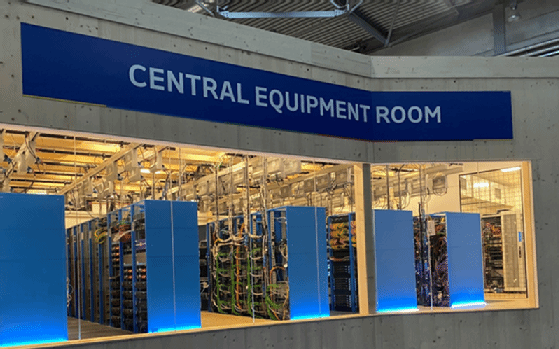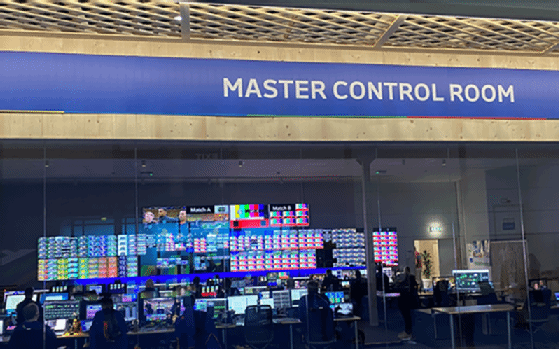
Atos jumps on ‘moving train’ for Euro 2024
Atos provides the IT supporting major recurring sporting events including Uefa’s European Football Championship
This summer’s men’s European Football Championship in Germany has been a showcase for how digital technology can transform the consumption of sporting events, but the unseen services and teams supporting logistics are the unsung heroes.
While broadcasters wow consumers with Euros coverage, the digital tech running event logistics will be classed a success if nobody even notices it’s there.
Atos took responsibility for IT planning and the delivery of core operational systems. Its sporting events team, in conjunction with Uefa tech teams, built a large temporary IT infrastructure able to cope with the demands of competitors, spectators, partner businesses and global broadcasters.
For the current tournament, Uefa’s information technology and communications support about 120 staff working at 11 sites, made up of the 10 stadiums where matches are played and the International Broadcasting Centre (IBC) in Leipzig, which hosts the heart of IT operations and the broadcasting centre. Each of the venues have IT service desks, open for a total of 6,354 hours during the tournament.
Atos’ current contract with Uefa will see it do the same in four years’ time in the UK and Ireland. In 2022, it won a contract with Uefa National Team Football, which hosts the Euros, to be its official technology partner.
While consumers see the final result of much of the work through broadcasts, what is not seen is the massive logistical efforts to ensure the tournament runs smoothly. This is where digital technology does its invisible work.
It might appear mundane, but if a critical member of staff arrives at the wrong place at the wrong time, or even the right place at the right time but with the wrong digital identity, disruption is possible. Multiply this thousands of times and there could be major problems. This can range from a group of sponsors being denied entry to a stadium to match officials missing a flight.
IT team
In a snapshot, the IT team supports about 150,000 requests for the accreditation of people, 15,000 hotel bookings, 17,000 transport transfers and 100,000 meal bookings. There were about 3,500 requests for uniforms by people staffing the event, 1,500 deliveries and 100,000 meal bookings, all managed digitally.
All of this requires a highly secure and always-on IT infrastructure.
In terms of IT hardware, the tournament has about 3,000 mobile devices, 1,000 televisions, 1,200 monitors, 300 printers and 70 video conferencing units. There are also thousands of kilometers of fibre networks laid for the event connecting all 11 centres, as well as multiple websites to manage, such as Uefa.com.
Atos described its preparations for major sporting events such as the Euros as akin to “getting on a moving train”. The analogy describes how work never stops at competition time or indeed between competitions.
Even the IBC in Leipzig is a passing guest in the German city. Prior to Uefa’s arrival at its location, a major horse show was held in the very building where the IBC was constructed. It’s put together using temporary materials that will be recycled or moved on to the next tournament in four years’ time. The IT equipment will also be used at upcoming events. Equipment provided by Atos will, for example, be used at the Women’s Euros in Switzerland next year.
The nerve centre
The IBC contains the nerve centre for Euros 2024 IT and broadcasting. Within the centre, there are about 130 IT staff dedicated to supporting the event, with around 70 more working for the IBC remotely.
Uefa chief information officer Hosni Ajala said that although the stadiums are the main locations where IT services are delivered, there are also training camps and other offices, as well as hotels, catered for around Germany.
“There are also a wide range of services provided off-site, such as the website, Uefa.com, gaming apps and a lot of services for different stakeholders involved in the tournament, such as accreditation services and forecasting, VIP services, media, and any population that is involved in our tournament gets access to specific services,” he said.

Uefa’s IT command centre (ITCC) sees Uefa work closely with Atos to monitor all services. “When everything is working well, we have lots of green lights, but when they move to yellow and red, we know there is an issue somewhere,” added Ajala
When issues arise, the first line of onsite IT staff will attempt a fix, but “as soon as it can’t be solved on-site, the ITCC takes over,” he said.
The ITCC also monitors cyber attacks, which for such a prestigious event are a very real threat. “As you can imagine, we are quite exposed as a well-known organisation,” said Ajala. “We are also exposed in the current political environment around the world.”
He said there are attacks on a daily basis, and that Uefa recently experienced a distributed denial of service attack from a single country on a specific website that saw 90 million hits in less than 10 minutes.
Security threats both physical and cyber require Uefa to work closely with local authorities in host countries.
“Each time we have a major tournament like the Euros, we usually work closely with the local authorities on various topics,” said Ajala. “This includes accreditation, where we work with police to do background checks on everybody that gets accreditation. We also work with local authorities on cyber security. It is always a joint effort with the host country.”
Read more about IT for sporting events
- Tech firm Atos has opened the Technology Operations Centre (TOC) for the Paris 2024 Olympic and Paralympic Games.
- Networking tech firms scrum down for Rugby World Cup: Leading communications providers look to form off-pitch connectivity spine of team with infrastructures using advanced networking and mixed reality technologies at pinnacle of world rugby.
- Ryder Cup testbed to feature tech firsts in Rome: This year’s Ryder Cup will test out technology to improve how fans digitally consume the event while reducing the workload on IT teams.
While the work of the ITCC is done behind the scenes, the fruits of the broadcast centre put the tournament in living rooms across the world.
Uefa also provides systems to customers such as international broadcasting companies, including the football service platform that stores and distributes past and current Uefa football data to external broadcasters and media. This includes data on fixtures, results, line-ups, standings and statistics.

The IBC supports 130 broadcasters operating in about 200 territories. It streams live pictures from almost 50 different cameras in the venues hosting matches, and sends data to commentary teams.
With the Euros in Germany and the Olympic and Paralympic games in Paris later this summer, Atos has two moving trains to deal with, and the firm has separate teams for both.
Regarding the Olympic and Paralympic games, Atos said all testing and preparation phases are done and it is already in operations mode. “The Atos team is fully mobilised to support the Games,” it said. “A team of more than 450 technicians on-site plus another 120 from remote locations are working to provide the services and solutions to the different stakeholders.”









